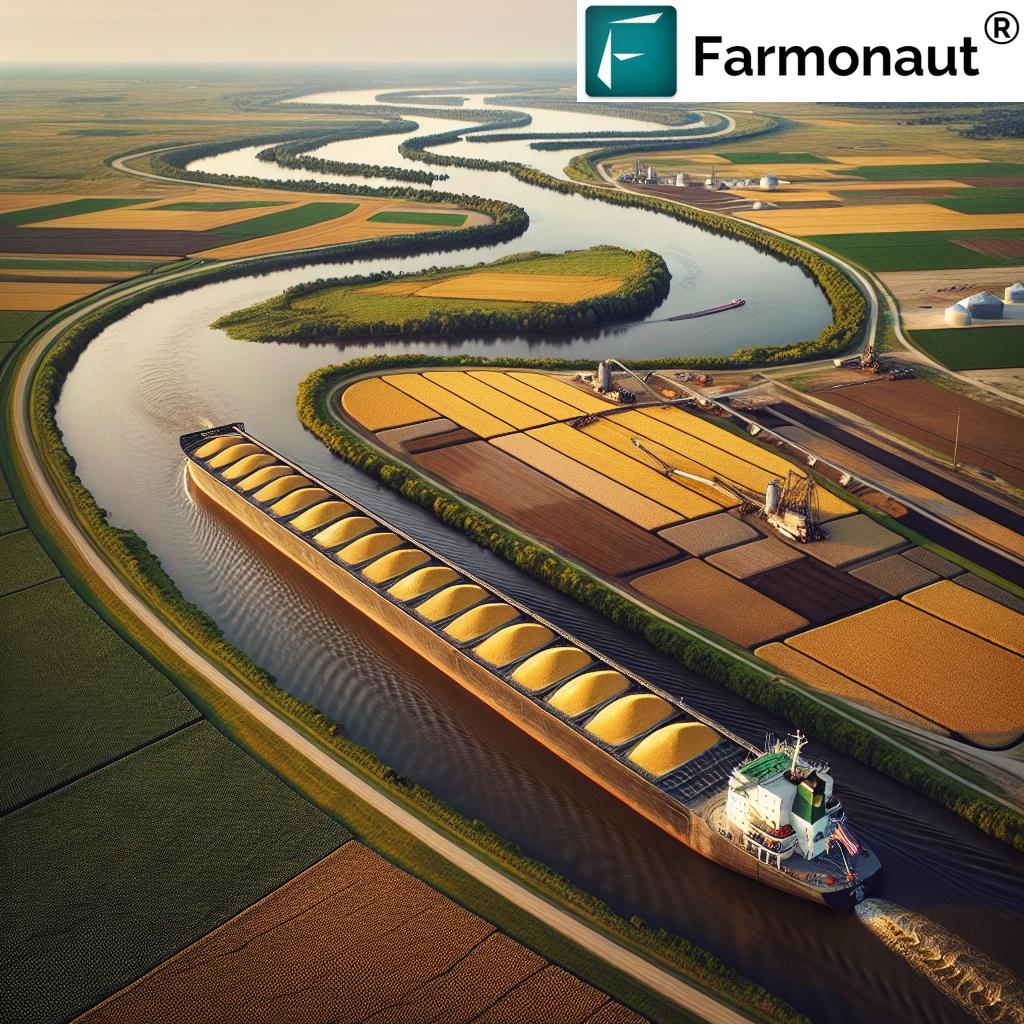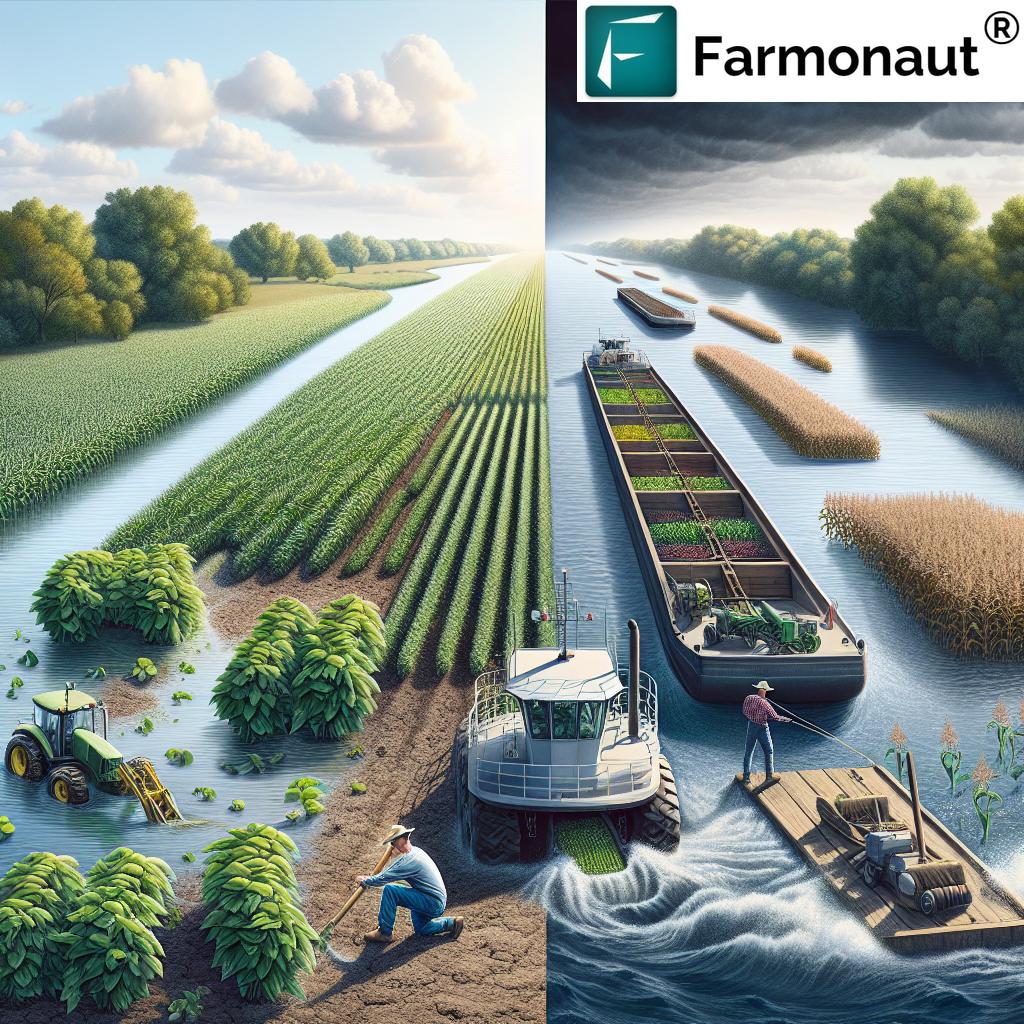Navigating Mississippi River’s Impact: Sustainable Agriculture Amid Climate Challenges

“The Mississippi River basin accounts for 92% of U.S. agricultural exports, highlighting its crucial role in global food security.”
Welcome to our comprehensive exploration of the Mississippi River’s profound impact on agriculture and its far-reaching implications for global food security. As we navigate through the complexities of river conditions, farming practices, and climate challenges, we’ll uncover the intricate relationship between this mighty waterway and the agricultural heartland of America. Join us as we delve into the economic ripple effects of floods and droughts, examine the critical role of water transportation in crop shipping, and explore innovative solutions for sustainable river agriculture.
The Mississippi River: America’s Agricultural Lifeline
The Mississippi River, stretching over 2,300 miles from Lake Itasca in Minnesota to the Gulf of Mexico, is more than just a geographical feature – it’s the lifeblood of American agriculture. This vast river system, with its expansive basin, plays a pivotal role in shaping the agricultural landscape of the United States and, by extension, global food security.
- Spans 31 states and two Canadian provinces
- Drains 41% of the contiguous United States
- Supports over 30 million acres of agricultural land
The river’s importance to agriculture cannot be overstated. It provides essential water for irrigation, serves as a crucial transportation route for agricultural products, and influences the climate and soil conditions of the surrounding farmland. Let’s dive deeper into how this magnificent river shapes American farming and impacts the world’s food supply.
Mississippi River Agriculture: A Global Powerhouse
The agricultural productivity along the Mississippi River basin is nothing short of remarkable. This region is often referred to as America’s breadbasket, and for good reason:
- Produces over 90% of U.S. agricultural exports
- Grows 78% of the world’s soybeans and 60% of its corn
- Supports diverse crops including wheat, rice, and cotton
The fertile soils of the Mississippi River Valley, combined with the river’s abundant water supply, create ideal conditions for farming. From the cornfields of Iowa to the soybean plantations of Illinois, the river basin is a mosaic of agricultural abundance.
The River’s Role in Agricultural Exports
One of the most critical functions of the Mississippi River is its role in agricultural exports. The river serves as a vital transportation artery, connecting the heartland of America to international markets:
- Over 60% of all grain exported from the U.S. is shipped via the Mississippi River
- Barges carry crops from farmlands to major ports like New Orleans
- Cost-effective water transportation keeps American crops competitive globally
The efficiency of river transportation cannot be overstated. A single barge can carry the equivalent of 70 truck loads of grain, making it an economical and environmentally friendly option for transporting bulk agricultural products.
Climate Variability and Its Impact on Mississippi River Agriculture
“Climate variability along the Mississippi River can impact up to 30% of U.S. farmland productivity, affecting millions of acres.”
The Mississippi River basin is not immune to the effects of climate change. Fluctuations in temperature and precipitation patterns have significant implications for agriculture in the region:
- Increased frequency of extreme weather events (floods and droughts)
- Changes in growing seasons and crop suitability
- Alterations in pest and disease patterns
These climate-induced changes pose challenges for farmers, from adjusting planting dates to managing water resources more efficiently. Let’s explore how these variations affect different aspects of farming along the Mississippi.
Flooding: A Double-Edged Sword for Agriculture
Flooding along the Mississippi River is a natural phenomenon that has both positive and negative impacts on agriculture:
- Deposits nutrient-rich sediment on floodplains, enhancing soil fertility
- Can delay planting or destroy crops if severe or poorly timed
- Impacts transportation, potentially disrupting crop shipping
While moderate flooding can benefit farmland, extreme flood events can be devastating. In recent years, we’ve seen an increase in severe flooding, leading to significant crop losses and economic hardships for farmers in the basin.
Drought: The Silent Threat to River Agriculture
On the other end of the spectrum, drought conditions pose a different set of challenges:
- Reduced water availability for irrigation
- Lower river levels affecting barge transportation
- Increased stress on crops, leading to reduced yields
Drought not only affects crop production but also impacts the entire agricultural supply chain. Low water levels in the Mississippi can cause bottlenecks in crop transportation, leading to increased shipping costs and potential export delays.

Economic Ripple Effects of River Conditions
The state of the Mississippi River has far-reaching economic implications:
- Fluctuations in crop yields affect global commodity prices
- Transportation disruptions can lead to increased food costs
- Agricultural losses impact local economies and national GDP
For instance, the 2012 drought led to an estimated $35 billion in agricultural losses, highlighting the economic vulnerability of river-dependent agriculture to climate variability.
Adapting to Change: Sustainable River Agriculture
In the face of these challenges, farmers and agribusinesses along the Mississippi are adapting and innovating:
- Implementing precision agriculture techniques
- Adopting drought-resistant crop varieties
- Improving water management and conservation practices
These adaptive strategies are crucial for maintaining agricultural productivity while minimizing environmental impact. At Farmonaut, we’re proud to contribute to this effort by providing cutting-edge satellite-based farm management solutions.
Our platform offers real-time crop health monitoring, AI-based advisory systems, and resource management tools that help farmers make informed decisions in the face of changing river conditions and climate challenges.
The Role of Technology in River Agriculture
Technology is playing an increasingly important role in helping farmers navigate the challenges of Mississippi River agriculture:
- Satellite imagery for crop monitoring and yield prediction
- AI-powered tools for optimizing resource use
- Blockchain solutions for improving supply chain transparency
These technological advancements are enabling farmers to make more precise decisions, reduce waste, and increase their resilience to climate variability.
Balancing Productivity and Environmental Stewardship
As we strive to meet growing global food demands, it’s crucial to balance agricultural productivity with environmental conservation along the Mississippi River:
- Implementing buffer zones to reduce runoff and improve water quality
- Promoting cover crops to prevent soil erosion
- Encouraging sustainable farming practices to protect biodiversity
By adopting these measures, we can ensure that the Mississippi River continues to support thriving agricultural communities while preserving its ecological integrity for future generations.
Explore Farmonaut’s API for advanced agricultural insights
The Global Implications of Mississippi River Agriculture
The health and productivity of agriculture along the Mississippi River have global repercussions:
- Influences world food prices and availability
- Affects international trade balances
- Impacts global efforts to achieve food security
As climate change continues to pose challenges, the resilience of Mississippi River agriculture will play a crucial role in ensuring global food stability.
Innovative Solutions for Crop Transportation
As river conditions become more variable, innovative solutions are being developed to maintain efficient crop transportation:
- Designing shallow-draft barges for low water conditions
- Implementing predictive analytics for optimizing shipping schedules
- Exploring alternative transportation routes and methods
These innovations are crucial for ensuring that agricultural products can reach global markets efficiently, regardless of river conditions.
The Future of Mississippi River Agriculture
Looking ahead, the future of agriculture along the Mississippi River will depend on our ability to adapt to changing conditions and embrace sustainable practices:
- Continued investment in climate-resilient infrastructure
- Adoption of advanced farming technologies
- Collaboration between farmers, scientists, and policymakers
By working together and leveraging cutting-edge solutions like those offered by Farmonaut, we can ensure a prosperous and sustainable future for Mississippi River agriculture.
Explore our API Developer Docs for integrating agricultural insights
Farmonaut’s Contribution to Sustainable River Agriculture
At Farmonaut, we’re committed to supporting sustainable agriculture along the Mississippi River and beyond. Our suite of tools and technologies empowers farmers to:
- Monitor crop health in real-time using satellite imagery
- Optimize resource use with AI-powered recommendations
- Track and reduce carbon footprints for more sustainable operations
By providing affordable access to advanced agricultural technologies, we’re helping farmers navigate the challenges of climate variability and maintain productive, sustainable operations.
Mississippi River Agricultural Impact Matrix
| River Condition | Agricultural Impact | Economic Effect | Sustainability Measures |
|---|---|---|---|
| Severe Flooding | Crop destruction, delayed planting | Estimated losses: $10-20 billion | Flood-resistant crops, improved drainage systems |
| Moderate Flooding | Improved soil fertility, potential planting delays | Mixed: +/- $1-5 billion | Adaptive planting schedules, controlled flooding |
| Normal Flow | Optimal conditions for most crops | Baseline productivity | Continued sustainable practices, water conservation |
| Mild Drought | Reduced yields, increased irrigation needs | Losses: $2-5 billion | Drought-resistant varieties, efficient irrigation |
| Severe Drought | Significant crop failures, transportation disruptions | Losses: $20-35 billion | Water recycling, crop diversification, precision agriculture |
Conclusion: Navigating the Future of Mississippi River Agriculture
As we’ve explored throughout this blog, the Mississippi River plays a pivotal role in shaping American agriculture and influencing global food security. The challenges posed by climate variability and changing river conditions are significant, but so too are the opportunities for innovation and adaptation.
By embracing sustainable practices, leveraging advanced technologies, and fostering collaboration across the agricultural sector, we can ensure that Mississippi River agriculture remains resilient and productive in the face of ongoing challenges. As we navigate this complex landscape, tools like those offered by Farmonaut will be essential in empowering farmers to make informed decisions and optimize their operations.
The future of agriculture along the Mississippi River is one of both challenge and opportunity. By working together and embracing innovative solutions, we can create a sustainable and prosperous future for this vital agricultural region, ensuring its continued contribution to global food security for generations to come.
FAQ Section
- How does the Mississippi River impact U.S. agriculture?
The Mississippi River is crucial for irrigation, transportation of agricultural products, and shaping the climate and soil conditions of surrounding farmland. It supports over 30 million acres of agricultural land and is responsible for transporting 60% of all grain exported from the U.S. - What are the main challenges facing Mississippi River agriculture due to climate change?
Climate change is causing increased frequency of extreme weather events like floods and droughts, changes in growing seasons, and alterations in pest and disease patterns. These factors can significantly impact crop yields and agricultural practices. - How do floods and droughts affect farming along the Mississippi?
Floods can deposit nutrient-rich sediment but may also destroy crops and delay planting. Droughts reduce water availability for irrigation, lower river levels affecting transportation, and increase stress on crops, leading to reduced yields. - What role does technology play in addressing agricultural challenges in the Mississippi River basin?
Technology like satellite imagery, AI-powered tools, and blockchain solutions are helping farmers monitor crops, optimize resource use, and improve supply chain transparency. These advancements enable more precise decision-making and increase resilience to climate variability. - How can farmers adapt to changing conditions along the Mississippi River?
Farmers can adapt by implementing precision agriculture techniques, adopting drought-resistant crop varieties, improving water management practices, and utilizing advanced technologies for crop monitoring and resource optimization.






